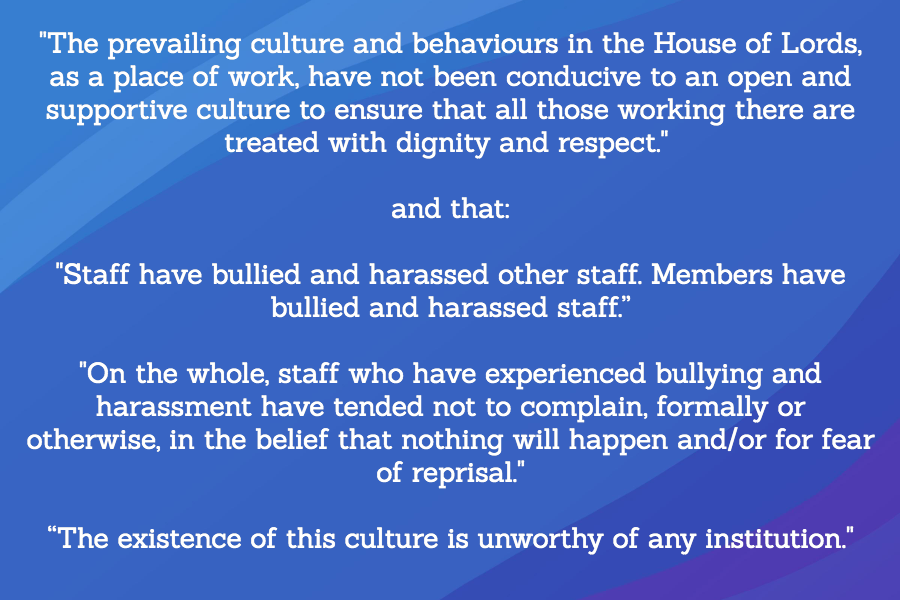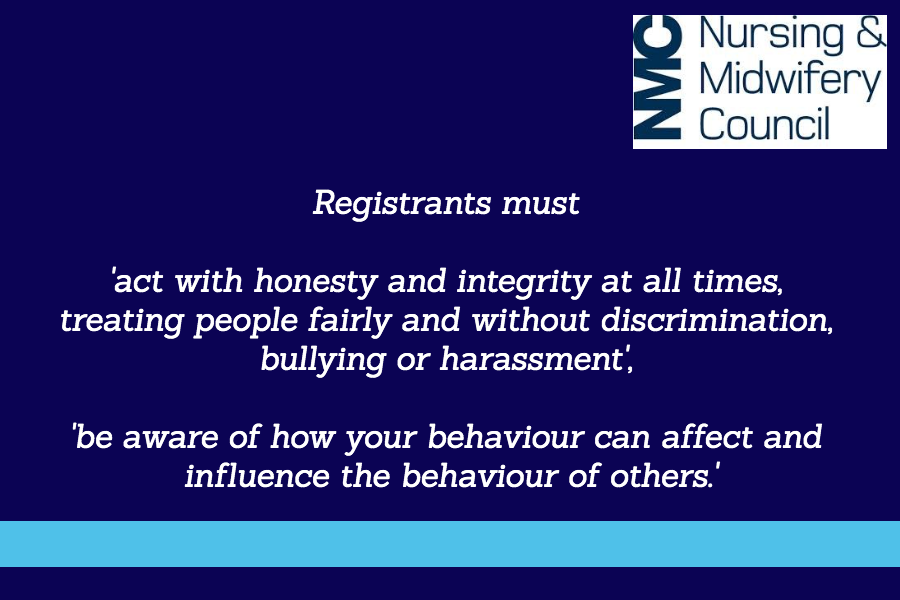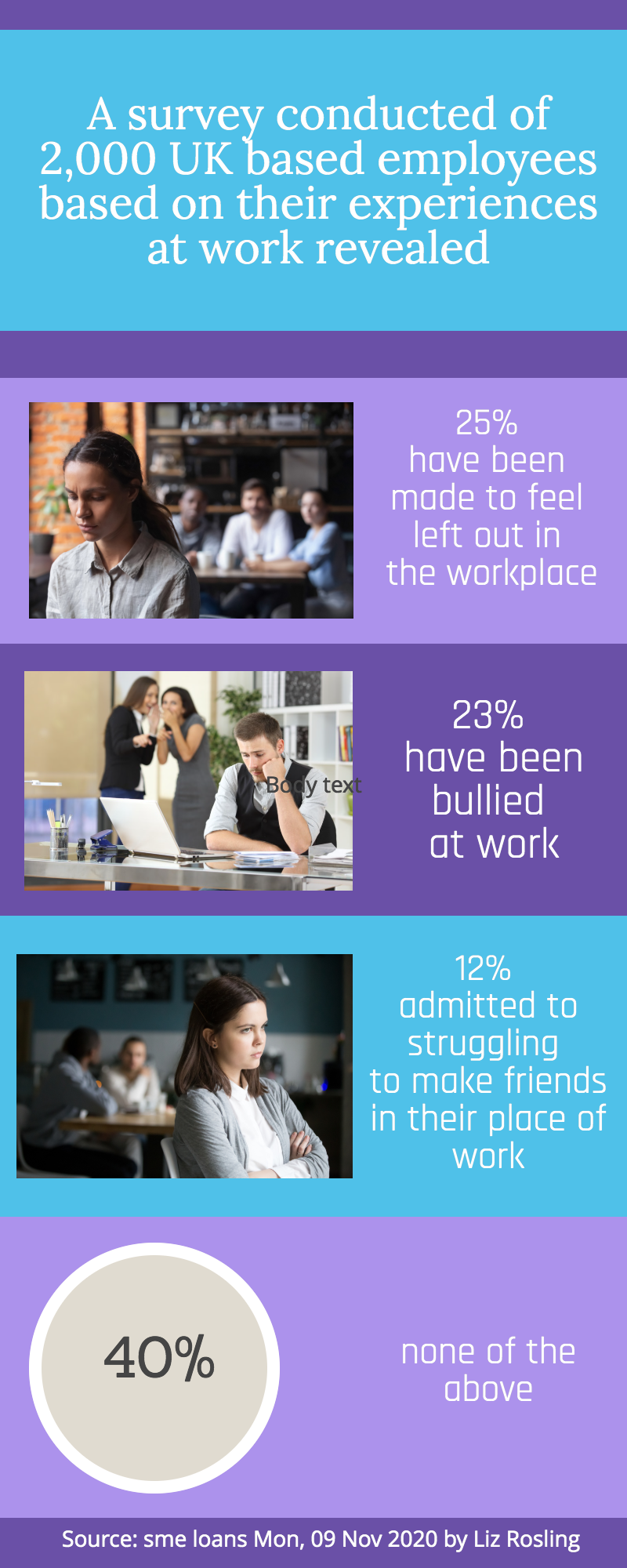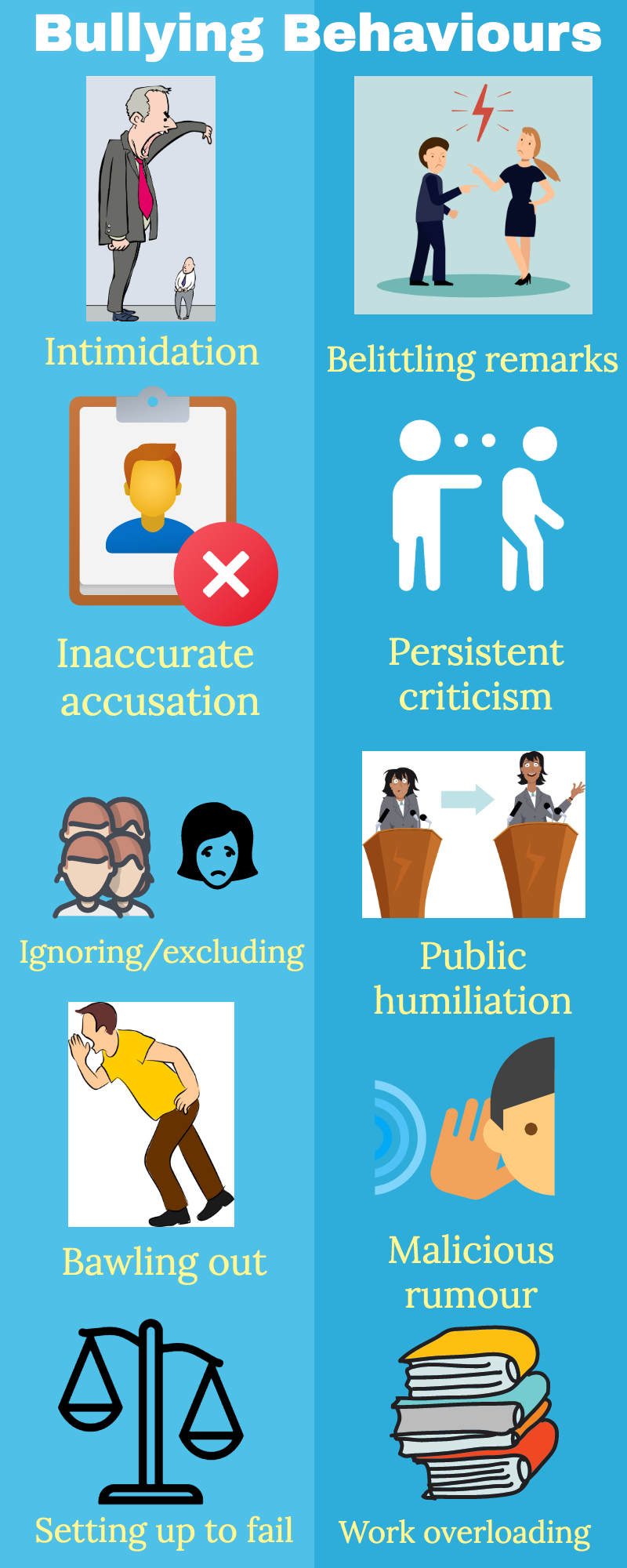Workplace Bullying: What is it? Does it Really Happen?
by Sue Hansard, Lymphoedema Nurse Specialist, Mentor, Educator and Writer at FIRST LYMPH CARE. If we are asked about BULLYING many of us will recall those kids at school who we were afraid of. The playground bully. It resonates with childhood, being childish even. But of course, bullying behaviour is not confined to the playground, to school, to children. It affects adults in every occupation, globally. It causes emotional and physical harm which one can take years to recover from. It leads to loss of productivity, effectiveness, increased sick leave, financial losses for the individual and organisation and a negative impact on the workforce.

Is it really that bad?
In 2019, Naomi Ellenbogen QC (1), published her report on the
House of Lords. She identified that:

Not having experienced something ourselves,
does not mean that the action didn't occur.
To make matters worse, our elected Prime Minister, tried to coerce the independent investigator to 'make (the report) more palatable'. So disillusioned was Sir Alex Allen, at the lack of support for victims of bullying, that he subsequently resigned.
Listening to those who have been bullied and believing and supporting them
is vital to their recovery from the harm they have experienced.

Bullying is characterised as 'offensive, intimidating, malicious or insulting behaviour. An abuse or misuse of power through means that undermine, humiliate, denigrate or injure the recipient.' (ACAS.)(2)
All professions will have their own code of conduct which members are expected to abide by. And most organisations now have mission statements and policies which will set out behavioural standards for all employees, e.g:

And yet many nurses, and teachers, especially at management level,
exhibit bullying behaviours? What are bullying behaviours?
There is no specific legal definition of bullying. Bullying can take many forms and is defined largely by its impact rather than intent.
Characteristically it is unwanted behaviour that offends, persecutes, or excludes someone.
Bullying may be overt: shouting or berating in front of others, but it is often more covert. Behind closed doors, subtle comments, important emails sent too late for a timely response, treating colleagues differently, excluding from team conversations.
Examples of bullying:
• Cyber bullying via social networks
• Unrealistic deadlines or workloads
• Sadistic/aggressive behaviour over a period of time
• Exclusion from meetings or team socialising
• Humiliating, ridiculing, criticising others in public/in private
• Persistent or unwarranted criticism, even in private
• Changing deadlines, workloads, meetings at short notice
• Withholding information which may affect performance
• Withholding support in the workplace
• Deliberately withholding information to affect a colleague's performance
• Withholding support in the academic environment or workplace.
Of course, this list is not exhaustive:
Currently bullying isn't classed as illegal under the Equality Act 2010 (3)
But harassment is. WHAT IS HARASSMENT?
The Equality Act 2010, describes harassment as unwanted conduct related to age, disability, gender reassignment, race, religion or belief, sex and sexual orientation, which is therefore unlawful. Significantly, the behaviour is 'unwanted and has the purpose or effect of violating a person's dignity, or creating a hostile, degrading, humiliating or offensive environment. The problem is that there are often a number of overlaps between harassment and bullying - where harassment is more direct, bullying is often less obvious, subtler and psychologically damaging.
Employers have a duty of care to provide and safe and healthy work environment for their employees. If an employer allows bullying or harassment in any form, they are failing in their duty of care
IS IT REALLY A PROBLEM? YES!
1/4 of UK employees bullied at work

DOES IT REALLY MATTER?
YES !
AND ON MANY COUNTS!
Roger Kline and Duncan Lewis ( 2019) (4) estimated that the annual cost to the NHS of bullying of staff by colleagues and managers is £2.28 billion a year.
In the charity sector employees are often more fearful of speaking up. They may feel a sense of guilt at seeking monetary compensation from a charitable organisation. So rather than seeking formal arbitration, or negative publicity for the organisation, they resign, rarely citing the precise reasons for their departure. WHY? Because they fear this will negatively impact on future employment. The charity sector is a small world!
WHAT CAN YOU DO IF YOU FEEL YOU ARE BEING BULLIED OR HARASSED?
Because there is currently no legislation in the UK to protect people who are experiencing workplace bullying. Legal protection may need to be found within other workplace legislation such as: Health and Safety at Work Act 1974 (5), Workplace (Health, Safety and Welfare) Regulations 1992 (6), RIDDOR 1995 (7), Provision and use of workplace equipment 1998 (8).
In the first instance: speak to your Union representative, or contact ACAS, CAB for advice and support.
- FIND OUT your employer's workplace bullying policy. It should outline the action your employer will take when a bullying is reported. And what process you should follow to try to resolve the issue. It should also outline what is unacceptable behaviour. Even without a policy, they must still abide by workplace legislation for the welfare of their staff.
- Contact your union Rep or their helpline for advice. (Or ACAS or CAB if you are not in a union)
- Write down what the issue is, how often it has occurred and why and how it makes you feel.
- Speak to a line manager or colleague for support. If you have an anti-bullying Rep at work, Or Freedom to Speak up Person: talk to them.
- Try to resolve the issue informally. This may be difficult, but face to face discussion is the most effective way. Plan what you will say
- Choose / book a mutually convenient time. ( i.e.: not when the perpetrator/or yourself is overloaded or stressed). Plan to have a colleague waiting for you.
Stay calm, Keep factual.
Explain the issue. Explain how it makes you feel.
Give the person time to respond. If they become angry/aggressive/verbally abusive state that you are unable to continue the meeting and leave.
Afterwards:
* Record what you did and what the response was.
* Record how you feel.
* Reflect again in a week or so to assess whether agreed action has taken place.
Seek independent advice ACAS, CAB, Union Rep. Also : https://speakupatwork.com
There are several online forums that will offer peer support for people who feel bullied at work. If you use LinkedIn there is a groundswell movement of people who will support and advise you, based on their own experience. Don't under estimate the powerful effect that the support of others can have in keeping you going.
- Read up as much as you can about your situation and your company's own policies.
- Write everything down. Start a folder and organise in date order... this makes it easier to find evidence when needed.
- Keep copies of all emails/ texts /written communications, including the TIMES AND DATES they were sent.
- Seek GP support. Contact Occupational Health. Keep records of everything.
- Keep positive.
- Surround yourself with supportive people you TRUST.
- Don't gossip or chat idly about your experience. Be careful who you discuss it with. (I was told NOT to discuss it with anyone. My dearest colleague never knew what I had experienced until after I had left. Yet I knew my bully was discussing things with colleagues. My family and close friends were my strength.)
- Treat your bully with the same politeness you do to others. Do not sink to their level.
- Find a hobby which is a good diversional therapy. Keep active. (Did you know you can swim and cry at the same time? It helped me!)
- If it helps you: write reflections on how you are feeling. If you are creative, write poetry/or paint. Use anything that will help you get the feelings out, don't bottle them up.
- Talk (virtually as well) to people who have had similar experiences.
- Write affirmations and place them in places around your work space. These can really help you when the bullying behaviour makes you doubt yourself, or damages your self-esteem and confidence. (I used these a lot. Sometimes reading them during my day. I hid them in desk drawers, under my computer, in my diary, so I could access them whenever I felt my confidence and self-belief waning.)
- Find a poem or song lyrics which you find uplifting and affirming. (I used Rudyard Kipling's 'IF', re writing the last verse to reflect my own situation. I framed it and hung it on the wall in front of my workspace, in our team office. No one really studied it: but it was my private victory, my private stance of 'head above the parapet'.)
- Print it out and place in a prominent place in your work space.
- Above all: do report it. The more we speak up and speak out, the harder it is for bullying behaviour to be tolerated.
- If your workplace is toxic: leave. And cite your reasons.
Since the start of the COVID-19 pandemic, new drivers for workplace bullying have become apparent. In the early weeks, people started to report that they were ridiculed for being Covid-cautious, 'paranoid', 'over-sensitive', others were told they had 'no choice' but to work as told. Health workers were expected to continue to work even in the absence of appropriate PPE's and without policies or procedures in place, there was uncertainty at every turn. In Nottingham, nurses claimed their covid-19 ward was "more like a prison camp" (9).
Now 9 months on uncertainty and consequently opportunities for bullying and intimidation of employees has increased:
- Role ambiguity
- Role lost due to reduced services/capacity
- Changes in working hours/ or location/environment Remote working- isolation
- Reduced training and support
- Changes in work levels
- Changes in line management
- Increased workloads
- Increased stresses
- Deadlines
- Lack of job security
- Possible redundancies
- If I speak up, it might get worse
So often I hear of people experiencing bullying and harassment at work, but who do not feel able to speak out. Many times, I was told to 'keep my head down', 'not to rock the boat'.
When bullying behaviours have become tolerated and 'accepted' within a workplace, its leadership style is toxic. This is common in the charitable sector, as it was in the House of Lords, where victims fear speaking up, and generally resign, often without expressing their true reasons.
But this simply perpetuates and embeds wrong behaviour and poor leadership.

Priti Patel gave a half-hearted apology, in no way acknowledging her accountability and in fact deflecting from it by saying that she was unaware that her actions were harmful or offensive and in turn, claiming that it was because she did 'not feel supported by her team' that she may have unintentionally caused offence.
How ridiculous is this?
Every organisation that works in and for the public, in any way, has an anti-bullying policy nowadays. And every such organisation will have training, be it face to face, or virtual, on bullying, how to recognise it, how to report it and why it is NOT acceptable in our workplaces.
Priti Patel will certainly have had such training, so to declare that she was unaware that her behaviour (shouting, swearing, verbal aggression and disrespectful language) was bullying is disingenuous in the least, outright lies at worst. That she could not bring herself to be accountable, and that no reassurance was made as to how she would behave in future, or whether she would undergo some re training (at least), indicates that she has not taken the Report findings seriously. It also underlines a lack of integrity and honesty. It will have done nothing to repair lost trust or improve working relationships with her team.
WHAT SHOULD THE EMPLOYER DO?
- Ideally, a thorough investigation should be carried out. It should be impartial and equally listen to both sides.
- Arbitration in terms of guided discussion between both parties by an independent person can really help to restore good effective working relationships.
- The bully, should be given additional training and support so that they can change their behaviours accordingly.
- If deemed serious enough, the perpetrator should be dismissed/demoted.
- A review date for both parties , to assess change and improvement
- A genuine apology can help the victim: but like Priti Patel, a bully is often unable/unwilling to take full accountability.
- Unfortunately, it is common for toxic organisations to deflect the blame, deny the existence of bullying and rare for them to accept accountability.
This in itself can be difficult to recover from. BUT you can and you will.
- Keep practising your resilience techniques
- Seek counselling
- Join online forums and support networks.
- Join Linked In or similar professional platforms and build your confidence through professional discussions and connections.
- REMEMBER you have acted with dignity and integrity. Your employer or manager has not.
- Use the experience to a positive end. Change career paths, take a leap of faith.
- Feel the strength that comes from the negative experience.
- BE PROUD of speaking out.
- Never resort to similar bullying behaviour yourself.
Because there is no legislation relating specifically to workplace bullying, there are therefore no guidelines on what is bullying, or any case law relating to how it might appear in practice.
In 'The Incidence of Workplace Bullying' Raynor, C. (1997), (10), noted in her study that most people identified their line manager or senior line manager as the bully. And most victims were in a 'staff' or junior position. They reported the following:

Before the Covid 19 pandemic, the caring professions (teaching, social work, health care) had the highest levels of recorded bullying, costing over £2 million/year. In the coming years of post-covid recovery, the incidence is likely to be greater and the cost both financial and human will be immense.
HOW CAN THIS CHANGE?
Incidences of workplace bullying are increasing, which suggest that in many organisations the reliance on policies, procedures and training in isolation is failing.
Recent high-profile cases and my own past experience underscore this. Because where there is a dictatorial style of leadership, rather than servant leadership, policies are ignored, and bullying or harassing behaviours are modelled from top-down and laterally.
LEADERS need to take full accountability. They need to be modelling compassion, listening, empowerment, a 'people matter approach'. They need to model honesty, integrity, trust. They need to make tough decisions and actually demonstrate a zero tolerance of bullying in all its forms, at all levels across their workforce.
The Parliamentary Peers who are not accountable, the Government ministers who, hide in plain sight flanked by Prime minister and self-serving hangers on, the CEO's of Charitable organisations who rule by fear, the Hospital Trusts, Managers and Trustees, who huddle together to conceal, distort, lie while paying lip service to the public whom they serve, these are all responsible if there is harassment and bullying of any sort happening in their organisations to any of their employees.
THE BUCK STOPS WITH THEM
But employees also need to speak up and speak out. Since my most recent experience of toxic workplace culture 4 years ago, there is now a groundswell of support for people experiencing bullying and harassment at work. Trade unions, online support groups, CAB, Speak Up Academy, can all offer excellent advice and help to steer us through the process of reporting incidences. Four years ago, my colleagues of 18 years, advised that I 'don't rock the boat', 'keep my head down', 'look after number one'. But this approach simply allows the behaviours to become embedded, accepted and reinforce the power base that authoritarian leaders rely on.
There are so many more effective styles of leadership: democratic, transactional, transformational, facilitative and affiliative.
That is why, we have to work together, to act collectively to stand up, speak out
ENOUGH IS ENOUGH! - Sue Hansard.
- On ZOOM: Moving On from Workplace Bullying
"Workplace bullying can leave you with your confidence and self-belief shattered and the impact can stay with you long after you have left a job, maybe even started a new role. You're not alone, and help is available" Nicki Eyre
Register your interest via the link, or email nicki@conductchange.co.uk for more information.
References
- An independent inquiry into bullying and harassment in the House of Lords report by Naomi Ellenbogen QC: 10 July 2019
- Bullying and harassment at work - A guide for employees - Advisory, Conciliation and Arbitration Service (ACAS)
- Equality Act 2010 (c. 15) Document Generated: 2020-12-01
- (2019) The price of fear: Estimating the financial cost of bullying and harassment to the NHS in England, Public Money & Management, 39:3, 166- 174, DOI: 10.1080/09540962.2018.1535044
- Health and Safety at Work Act 1974
- Workplace (Health, Safety and Welfare) Regulations 1992
- RIDDOR 1995
- Provision and use of workplace equipment 1998
- Nottingham nurses claim Covid-19 unit was ‘more like a prison camp’ - Nursing Times, 22nd July 2020
- The Incidence of Workplace Bullying, Raynor C (1997), Journal of Community & Applied Social Psychology, Vol. 7, 199±208 (1997)




